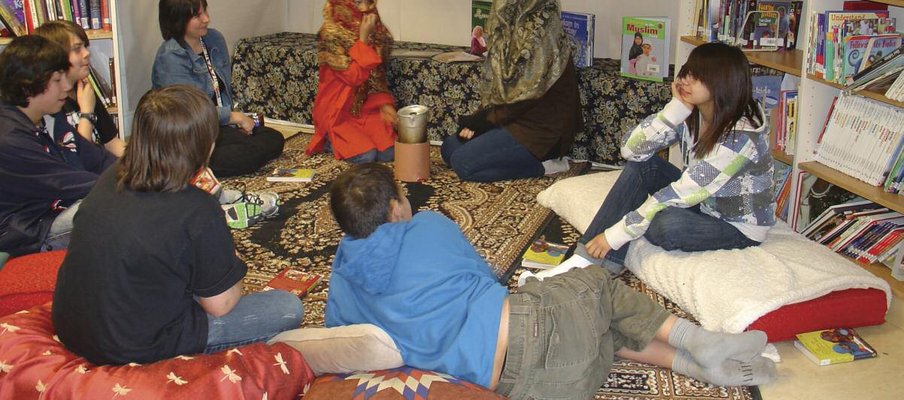Cross cultural learning in the classroom

Related Programs
School is a place where we can learn about the world around us, but it is just as important for all students to see themselves reflected in curriculum, resources, and structure of learning.
Multicultural Council of Saskatchewan (MCoS) is working with teachers around the province to develop innovative programming that promotes cross-cultural learning.
“It is essential to engage young people in multicultural initiatives and strive to create educational experiences that promote learning about the deeper context of the visible aspects of culture,” says Rhonda Rosenburg, executive director of MCoS, “Some schools are incorporating deeper, more critical and more contextual learning. It is very important that we understand the cultural contexts of expressions of culture such as food, dance, and clothing – how they fit in the deeper world views and values”.
Last year, through its Multicultural Education Initiatives (MEI) grant, MCoS funded 44 projects that promoted multiculturalism and anti-racism. One funded project, called Three Cups of Tea, uncovered a new understanding for cultural differences amongst students at Muskoday First Nation Community School. A school-wide unit of study was created on Pakistani and Afghanistan peoples’ customs, religions, social, and economic situation. All students from kindergarten to grade 8 participated in some way. Students were read books and shown maps of the world to learn about developing countries. They learned about immigration and developed an appreciation for why people would immigrate.
According to Carla Hope, project coordinator and librarian at Muskoday First 8 Engage Spring 2011 Nation Community School, “They [the students] need to learn that when people come to Canada, they are free to practice their own religion and culture, just as we are free to practice ours.”
Students in Grade 6 and 7 were also tasked with reading the book Three Cups of Tea: Young Reader’s Edition and asked to discuss the themes, then research Islamic culture and religious practices. “The intention was to draw parallels between First Nations values and Islamic values while exploring and appreciating the differences,” explains Hope. “Students discussed, compared, and contrasted life in Pakistani villages with the community of Muskoday. “The program encouraged them to imagine life as a refugee and starting a new life with new customs. Even a part of the school’s library was set up to simulate a home in the village of Korphe, Pakistan.
“The project built a positive and lasting impact on the students,“ says Hope, who saw the students display actions of acceptance, understanding, and empathy when interacting with their female Muslim peers at a Saskatoon conference.
Many other Saskatchewan schools are also trying to educate their students and staff members by learning history from multiple perspectives, learning about contributions of individuals or groups from different backgrounds, and dispelling myths and stereotypes.
Celebrations can help create an awareness of many cultures. Rosenburg adds that “Much of the multicultural education in schools takes the form of celebrations. Through this awareness and education, schools are beginning to see more positive cross-cultural interactions and the future is increasingly promising. “There is an increasing trend towards children making friends based on common interests, more than a shared cultural background.”
Thanks to annual funding from Saskatchewan Lotteries Trust Fund for Sport, Culture and Recreation, MCoS is able to offer the MEI grants to schools and school boards in Saskatchewan. These programs aim to benefit students through classroom and professional development projects that promote the understanding, respect, appreciation, acceptance and celebration of all people as equally valuable in our society.
Rosenburg says, “Schools have used the MEI funding for anti-racism workshops, Saskatchewan Multicultural Week, cultural presentations, education week activities, First Nations and Métis awareness building projects, conflict resolution workshops, and multi-faith and human rights projects.“ These, along with activities that work towards the elimination of racism and discrimination, contribute to the understanding, respect, appreciation and acceptance of all people as equal in our society.
For more information on the Multicultural Education Initiatives Grant or Multicultural Council of Saskatchewan, visit www.mcos.ca

